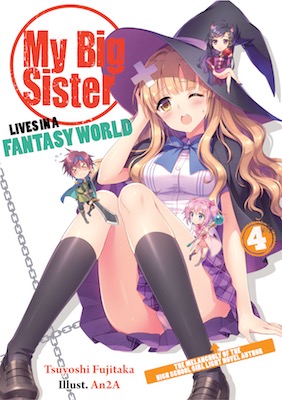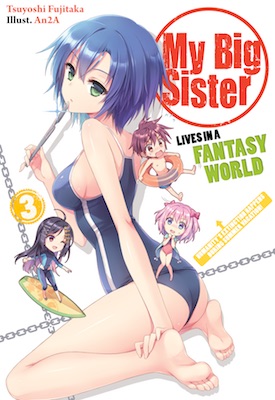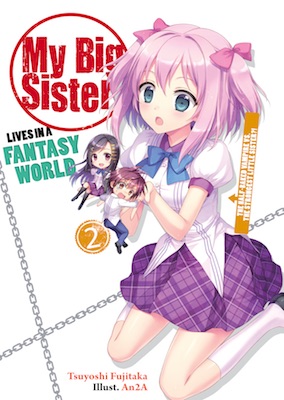By Tsuyoshi Fujitaka and An2A. Released in Japan as “Neechan wa Chuunibyou” by Hobby Japan. Released in North America digitally by J-Novel Club. Translated by Elizabeth Ellis.
I will save my objections for later in the review, so let me start by saying that a lot of this book is fun as usual. The author is getting more blatant in his Haruhi rip-offs, from the title of this volume to the fact that the villain is disappointed at Yuichi’s proactive personality and says she wants someone who says “yare yare” all the time, and it’s still funny. Mutsuko gets a lot less to do here than she normally does, but is still amusing in a “if I start to take her seriously she will be a Cthulian horror’ sort of way. Aiko and Yoriko make a good double act, and I’m amused at people saying Aiko’s not as much of a threat in the ‘love interest’ category as she’s too passive. And the overarching plot, which looks like it will be the core of the rest of the series, is not all that bad, taking the metatextual Haruhi stuff and trying to spin it in a dramatic way.
But enough of that, let’s move on to Kanako, who gets the spotlight here at last. I admit I had been misreading her in the first couple volumes as something of an airhead type, but now it becomes apparent that it’s more ‘withdrawn from reality’. And more to the point, Kanako has suicidal thoughts, and the book begins with her attempting to kill herself (it’s when she first meets Mutsuko and Yuichi). I will be fair, this scene works quite well. Mutsuko’s flip “that’s boring!” grates, but her solution, although ludicrous, teaches an important lesson, one that I think Kanako grasps. No, the trouble I have with Kanako’s subplot comes later in the book. Her relationship with her mother is written in a completely serious, realistic way, with no parodic elements at all, and the scene where she sees her, happy with her new family, is devastating. Having the villain take credit for her entire past, including her mother wanting a son so much that it poisoned her entire relationship with her child, is frankly awful and makes light of Kanako’s pain.
As for the climax of the book, Yuichi pays some lip service to the fact that you can’t just magically fix a suicidal person’s thoughts with a few well-intentioned words, but then he goes ahead and does it anyway. And Kanako is now added to the love interest pile, and I have a sneaking suspicion that we aren’t really going to touch on her problems again. It’s maddening in many ways, and one reason I find it hard to fully embrace this series – if it’s going to be a parody of Haruhi and similar series, it shouldn’t be using darker subplots like this one and the kidnapped girls one from Book 3, and if it does use the serious plots it should commit to them seriously and not handwave it away with the power of Yuichi’s GAR. And so I’m left with feelings of ambivalence. I do hope the next book uses Mutsuko more, as I find the series at its most intriguing when it’s examining her incredibly broken mindset.





